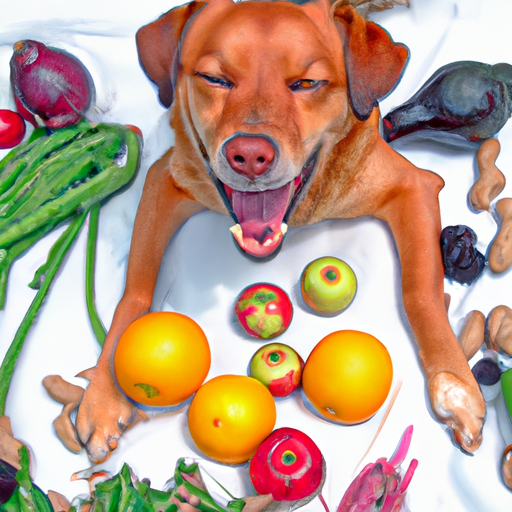As a responsible and loving dog owner, you’re always looking for ways to ensure your furry friend stays healthy and happy. One such way is through their diet. While dog food is specially formulated to provide all the nutrients your dog needs, supplementing it with certain fruits and vegetables can provide additional health benefits. However, it’s important to know which ones are safe and beneficial for your dog. So, what fruits and veggies are good for dogs? Let’s dive in.
Table of Contents
1. The Benefits of Fruits and Veggies for Dogs
2. Safe Fruits for Dogs
3. Safe Veggies for Dogs
4. Fruits and Veggies to Avoid
5. How to Introduce Fruits and Veggies into Your Dog’s Diet
6. Frequently Asked Questions
Key Takeaways
– Certain fruits and vegetables are beneficial for dogs and can provide additional vitamins, minerals, and fiber.
– It’s essential to introduce new foods gradually and consult with a vet to ensure they’re beneficial for your particular dog.
– Not all fruits and vegetables are safe for dogs; some can be toxic.
The Benefits of Fruits and Veggies for Dogs
Fruits and vegetables can be a great addition to your dog’s diet. They provide a wide range of health benefits due to their high content of vitamins, minerals, and fiber. For instance, they can support your dog’s digestive health, improve skin and coat conditions, and boost their immune system. Furthermore, they’re a great low-calorie treat option for dogs that need to lose weight.
A detailed article on OneTopDog provides more insight into the benefits of a balanced diet for dogs.
Safe Fruits for Dogs
As a rule of thumb, always remove seeds, pits, and stems before giving fruits to your dog.
- Apples: Rich in vitamins A and C, fiber, and antioxidants. They’re great for a dog’s dental health.
- Bananas: High in potassium and vitamins, but be mindful of their sugar content.
- Blueberries: Packed with antioxidants, they’re a great snack for dogs.
- Cantaloupe: This fruit is safe but should be given in moderation due to its high sugar content.
- Cranberries: Both raw and dried cranberries are safe. They can help with urinary tract health.
For a more comprehensive list of safe fruits for dogs, read this post on OneTopDog.
Safe Veggies for Dogs
Vegetables are generally lower in sugar and can be a great addition to your dog’s meals.
- Carrots: High in vitamin A and fiber, they can support eye health and digestion.
- Cucumbers: A great low-calorie snack for overweight dogs.
- Peas: Packed with vitamins, including A, K, and B-complex, as well as plenty of fiber.
- Sweet Potatoes: High in fiber, they’re great for digestive health but should be cooked before serving.
- Pumpkins: Beneficial for a dog’s digestive system.
Find more information about safe vegetables for dogs in this OneTopDog article.
Fruits and Veggies to Avoid
While many fruits and vegetables are safe for dogs, others can be toxic. Avocados, cherries, grapes, and mushrooms are a few examples. For more details, check out this list of foods to avoid from the ASPCA.
How to Introduce Fruits and Veggies into Your Dog’s Diet
When introducing new foods into your dog’s diet, start slowly. Gradually add small quantities to their regular meals and observe them for any adverse reactions. Always consult your vet before making significant changes to your dog’s diet.
Frequently Asked Questions
1. Can dogs eat all fruits and vegetables?
No, not all fruits and vegetables are safe for dogs. Some, like grapes and avocados, can be toxic.
2. How should I serve fruits and veggies to my dog?
Most fruits and veggies should be served raw and thoroughly washed. However, some, like sweet potatoes, should be cooked.
3. How much fruits and veggies can I give my dog?
Fruits and veggies should make up no more than 10% of your dog’s daily caloric intake. Always consult with a vet for personalized advice.
Remember, while fruits and veggies can be a healthy addition to your dog’s diet, they should not replace a balanced, complete dog food diet. Always consult with a vet before making any significant changes to your dog’s diet.



